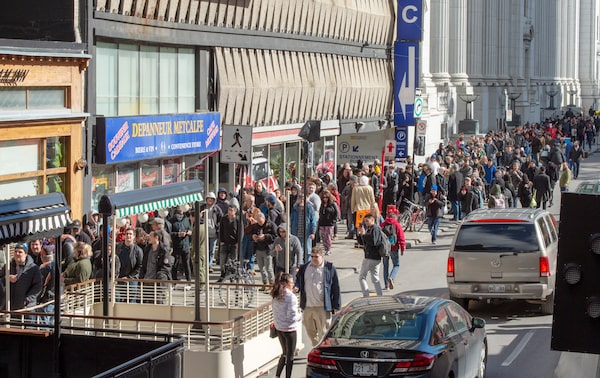Part of cannabis laws and regulations
Many municipalities across Canada are struggling with how close to schools, parks and other child-friendly spaces legal cannabis can be sold in the absence of any direction from the federal government.
Some cities are following Vancouver’s lead and ordering marijuana shops to be at least 300 metres from such facilities. That number was set three years ago when council passed a bylaw to regulate an explosion of illicit operators. Vancouver consulted U.S. jurisdictions to come up with the number.
However, Alberta has suggested to its municipalities that keeping cannabis sales 100 metres away from schools is enough to protect public health. Quebec has opted for 250 metres.

Hundreds of people line up at a government cannabis store on Oct. 17, 2018, in Montreal as the legal sale of cannabis begins in Canada.Ryan Remiorz/The Canadian Press
Kerry Jang, who just ended his final term as a Vancouver councillor, said the 2015 cannabis-store bylaws he helped craft were based on best practices in U.S. states that had legalized the drug. He said the main concern for bureaucrats and public health researchers was that the outlets remain out of children’s sight so they do not attract them to cannabis.
“Three hundred [metres] was seen as enough of a deterrent and enough of a ways away from school so that the kids couldn’t observe it,” he said. “You didn’t want kids to observe people going in, that’s why that number was chosen, it wasn’t just throw a number up in the air.
“I know the activists say, ‘Oh it’s good for you,’ but it’s still a psychoactive substance.”
The 300-metre rule also relates to U.S. federal drug-sentencing guidelines that punish drug dealers more harshly for selling or producing illicit substances within 1,000 feet of schools. Before Colorado legalized cannabis six years ago, a U.S. lawyer demanded that more than 50 recreational outlets move away from schools or face seizures or criminal charges.
Dan Werb, director of the Toronto-based International Centre for Science in Drug Policy, said research has shown cannabis consumption can harm young people, but because legalization is relatively new, data are scarce on how the locations of licensed storefronts affect public health.
“The evidence just doesn’t exist yet because we haven’t seen how a regulated system like this in terms of geographic proximity, how it influences use,” he said.
The independent panel that guided Ottawa on legalization recommended that cities limit the density and location of cannabis shops, but neither the panel nor the new federal cannabis laws set distances.
Dr. Werb said the best evidence-based policies for zoning these stores would include determining how many outlets are needed to meet local demand before rules are imposed for the distance between stores, as well as from schools. He said the number of stores in a given area is more likely to affect overall rates of use, at least according to “pretty compelling” research tracking the clustering of liquor stores in the United States. Another challenge for cities is that very large buffer zones could tamp down the legal supply too much, he added.
“If there isn’t sufficient access, it’s going to embolden the black market, which is exactly the opposite of what this government is looking to do,” Dr. Werb said.
Calgary could have one of the highest concentrations of licensed cannabis retailers in the country after setting its buffer distance between stores at 300 metres and only 150 metres from schools, which is still more than Alberta’s suggested standard of 100 metres.
In the coming weeks, Ontario is expected to unveil its new rules for a private network of marijuana stores. Premier Doug Ford signalled in this year’s election campaign that he did not support a controversial site the previous government had proposed for a Scarborough cannabis outlet because it was about 300 metres from a local school.
Vancouver is fighting in B.C. Supreme Court to get an injunction to shut down more than 40 illegal dispensaries, many of which are within 300 metres of a school, a community centre or another cannabis outlet. The lawyers for those shops say the distancing requirements are unconstitutional because some medical customers cannot travel far.
Available now: Cannabis Professional, the authoritative e-mail newsletter tailored specifically for professionals in the rapidly evolving cannabis industry. Subscribe now.
 Mike Hager
Mike Hager